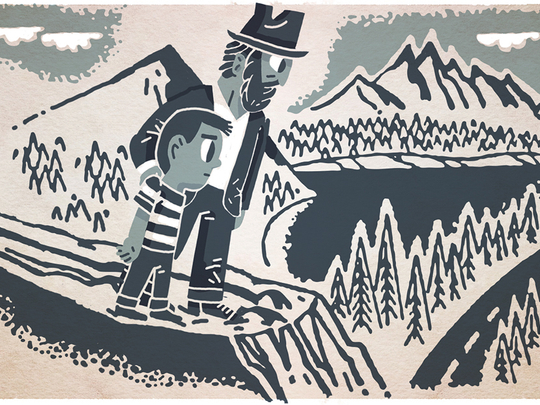
Census
By Jesse Ball, Ecco, 272 pages, $17.95
Two very different literary impulses collide in Jesse Ball’s new novel: old-fashioned memoir and modernist fable. One might think they were incompatible, given their allegiances to the separate truths of experience and imagination, but it’s a testament to the skill of this talented writer (on the Granta best young American novelists list in 2017) that they end up enhancing each other in all kinds of unexpected, often remarkable ways.
An opening note states the author’s intention to write about his brother, Abram Ball, who had Down’s syndrome, and whose life (he died aged 24) was “something so tremendous, so full of light, that I thought I must write a book that helps people to see what it is like to know and love a Down’s syndrome boy or girl”. Family photos at the end imply that this is not some metafictional gambit.
The same note explains an authorial decision that, since Ball grew up thinking of himself as a caretaker figure to his brother, he will recast the fraternal relationship as one of father and son. It seems a modest change, promising a judicious measure of artfulness while suggesting the story isn’t going to stray far from reality, much less from realism itself.
So it’s a surprise to find oneself, a few pages later, plunged into a high-concept fable about a dying census taker and his son driving through a country as surreally like and unlike America as the land of Kafka’s Amerika, on a mission that has more in common with the metaphysical investigations of Beckett’s tramps and Rilke’s angels than anything you’d find under “What we do” on the US Census Bureau’s website.
As with anything original, Census takes getting used to. It’s written very idiosyncratically. Unlike the austere verbal neutrality of the Kafka stories it otherwise resembles, it cultivates a folksy, whimsical style that can cloy. Some phrasing sounds like pastiche Thoreau: “I have often tried to look through the eyes of those who find in the most familiar things an endless reverie.” And you’d have to have a very sweet tooth to enjoy some of the loftier rhetorical moments: “Is there none who can simply wander alone beneath a sort of cloth tent painted with dreams?”
I’m not sure the voice ever won me over entirely, but I found myself able to accept it, or ignore it, as I got absorbed in the story’s larger inventions. There’s the initially perplexing but (as it turns out) precisely imagined matter of what it means to be a “census taker” in this universe. Not to give too much away, we come to understand it as a kind of redemptive and transformative witnessing of people’s lives. Underlying it is the Socratic dictum about the unexamined life not being worth living, along with the scriptural idea of the recording angel who notes our every thought and deed.
It sounds a bit solemn, perhaps, but it’s done with a light touch and a resourceful sense of drama. And there’s the basic fascination of the interviewees. Like any good road novel, Census is at one level a gallery of quickly sketched encounters, and among the book’s pleasures are the characters who open their doors to this itinerant father and son. There’s a sinister detective, a thumbless doctor at a fantastical rope factory, a hipster puzzle maker, an alarming nymphomaniac and her even more alarming sister. There are figures who seem to have stepped from a Wes Anderson movie, a Tolkien novel, a Bruno Schultz short story and Greil Marcus’s “old, weird America”. They’re all vividly rendered, often with wonderfully macabre or bizarre stories in their background, and advance a sustained philosophical inquiry into the nature and limits of human empathy, specifically in the way they relate to the son.
It’s with the son that the element of lived experience enters the story most poignantly. Vignettes that crystallise the boy’s touching (often very funny) way of looking at things crop up as scenes or memories throughout the book, adding the tang of observed reality to its more speculative qualities. Here are the father and son approaching a house: “I wanted to pass it by, but my son insisted. Why did he insist? I think it was because there was a round window in the face of the house.” And here they are after the son has had a turn at the wheel: “He said this after driving the car: now I am a driver. I said, yes, but don’t drive the car without me. He said you don’t drive the car without me.”
You don’t have to have any particular interest in Down’s syndrome to connect with this aspect of the book: it isn’t a polemic about special needs, but a detailed and moving portrayal of a kind of radical innocence, one that brings both the cruelty and the kindness in the world around it into sharp focus. For me, it was the most powerful of the many surprises in this unusual, impressive novel.
–Guardian News & Media Ltd
James Lasdun’s The Fall Guy is published by Vintage. Census is published by Granta.









